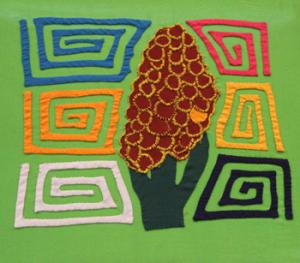Improving lives is one of the U.S. Grains Council’s core missions, and the Grains Foundation is a means that allows Council membership to further that goal in substantial ways. During the Council’s 2012 International Marketing Conference in Panama City, Panama, the Grains Foundation came through again when attendees visited the San Jose de Malambo Orphanage and participated in a spirited auction (sponsored by Monsanto) for 28 locally made moulas (traditional Panamanian artwork of fabric). The proceeds were contributed to the Orphanage. In total, the auction generated $16,450 in much needed funds, with an additional $1,000 contributed through generous private donations.
“Putting actions behind our words truly drives home our mission to improve lives. It’s great to see both staff and members respond to a common cause,â€� commented Terry Vinduska, Chairman of the Grains Foundation.
Opened in 1890, the Malambo orphanage is run by the Caltholic Sisters of Mercy, San Jose. It receives no government funding and is dependent on individual and corporate donations to serve the 180 children who call it home. Without financial support, access to medical treatment and even basic nutrition is limited. The orphanage also administers a school of 400 students.
During the conference, two separate groups of guests visited the orphanage to provide the students and children something more than financial support – much needed human contact. “These are beautiful children that the Sisters of Mercy care for with tenderness and love. We are thrilled to be able to help them through this donation from the auction,â€� said Janet Shauman, wife of U.S. Grains Council Chairman Dr. Wendell Shauman.
 The Grains Foundation was established by members of the U.S. Grains Council in 1983. It was formed in an effort to improve world food availability and quality; to strengthen the role of the marketplace in resolving global supply and demand issues; and to build partnerships with agricultural producers, agribusinesses and governments in developing countries through market education programs. It relies on voluntary contributions from individuals and organizations dedicated to furthering these goals.
The Grains Foundation was established by members of the U.S. Grains Council in 1983. It was formed in an effort to improve world food availability and quality; to strengthen the role of the marketplace in resolving global supply and demand issues; and to build partnerships with agricultural producers, agribusinesses and governments in developing countries through market education programs. It relies on voluntary contributions from individuals and organizations dedicated to furthering these goals.



